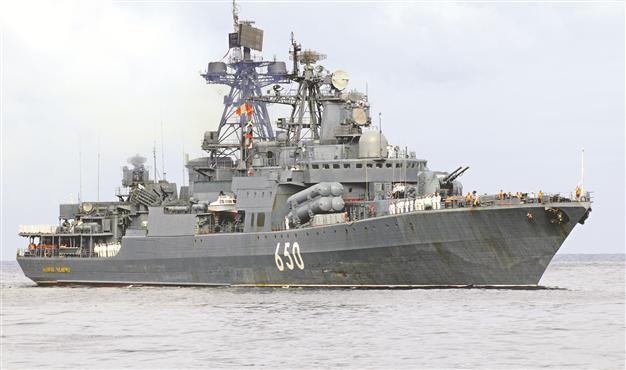Russia wants naval bases abroad, navy chief says
MOSCOW

Peter the Great, Russian nuclear-powered missile cruiser seen near Severomorsk, Russia in this 2001 photo. AFP photo
Russia is talking to Cuba, Vietnam and the Indian Ocean island country of Seychelles about housing Russian navy ships, the nation’s navy chief said.“It is true, we are working on the deployment of Russian naval bases outside Russian territory,” Vice Admiral Viktor Chirkov told the RIA Novosti news agency. “Within this work we are discussing the possibility of creating material and technical supply centers on the territory of Cuba, Seychelles and Vietnam,” Chirkov said ahead of a meeting between Russian President Vladimir Putin and Vietnamese counterpart Truong Tan Sang yesterday. RIA Novosti said that the necessity to open the new naval bases abroad was first mooted in 2008 when the Russian fleet participated in anti-piracy operations in the Gulf of Aden, according to Agence France-Presse.
The Soviet Navy had foreign bases in Cam Ranh, in the south of Vietnam, and Tartus in Syria. Putin decided in 2001 to shut the Vietnamese base, which Moscow had rented since Soviet times as a result of a 1979 agreement between Vietnam and the Soviet Union. Russia left the base in 2002. The Syrian base in Tartus, which was created in 1971 as a supply center for the Russian fleet in the Mediterranean, became Moscow’s only military base outside the USSR.
Vietnamese President Truong Tan Sang, who was in Russia and was to meet Putin on July 27, was quoted as telling a Russian radio station that Vietnam has “no intention of cooperating with any country with the aim of military use of the port of Cam Ranh,” Reuters reported.
Vietnam port will be open to a strategic partnership
However, Sang was quoted as telling Voice of Russia radio that a maintenance and service facility at the port would be open to ships from all nations and that, in the interest of furthering a “strategic partnership” with Moscow, Vietnam “will provide Russia with advantages in Cam Ranh, including with aim of developing military cooperation.”
Although analysts see the Tartus base as a key strategic asset for Moscow in the Mediterranean, its infrastructure is extremely modest with just a few dozen staff based there at any one time and naval vessels only visiting for brief calls. During the early years of his presidency, Putin also closed a Russian listening post on Cuba, a key Soviet-era client.
















